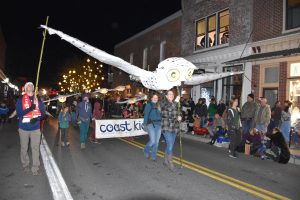By Tara Fischer
Staff Writer
A discussion this week among Berlin officials and residents highlighted frustrations over the town’s new policy that limits when spectators can place chairs along Main Street ahead of the annual Christmas Parade and summertime Bathtub Races.
The town recently announced that members of the streetside audience cannot place chairs or blankets along the sidewalks until two hours before an event begins, when the roads are formally closed for the event. In the case of the Christmas Parade, scheduled for Dec. 4 this year at 7 p.m., that means no seating is permitted before 5 p.m.
Before the rule change, chairs and blankets were lined up on the sidewalks along Main Street, sometimes even before sunrise on the day of the Christmas Parade, by residents who aimed to secure a front-row viewing position. Now, that tradition is coming to an end.
Despite the argument from staff that the new policy will make the pedestrian paths safer for wheelchair users and other individuals with disabilities, some residents argue that the move is not fair.
During Monday’s mayor and council meeting, resident Mary Hedlesky stated that enforcement feels unfair to residents. At the same time, businesses continue to place merchandise, tables, and sandwich boards along the sidewalks throughout the year.
“I don’t have a problem with the policy itself and the reasons behind it, but it’s very unfair,” Hedlesky said. “It’s two times a year where we allow residents to put chairs out for the Christmas Parade and Bathtub Races, and meanwhile, businesses do this 365 days a year. It’s just not right.”
The rule mandating that pathways be kept clear has been in place for years, but was rarely enforced. Berlin Mayor Zack Tyndall said the decision to implement the regulation was based on safety and accessibility concerns.
“The stem of this really was last year; we had some folks in wheelchairs that could not access or move about the sidewalks in Berlin,” Tyndall said. “…[Chairs] were blowing into the streets multiple times, and then public works had to go out there and set them back up in what they thought was the appropriate space…It does feel like home seeing the chairs lined up along Main Street. But we also have to be cognizant that we have a responsibility to make sure those sidewalks are ADA compliant and the chairs are not ending up in the streets like they have been.”
Councilman Jay Knerr asked why the policy announcement had been released without council input.
“We had this longstanding policy that was never enforced, and then all of a sudden it gets enforced,” Knerr said. “Why did that happen, and why wasn’t the council involved? It’s frustrating to get calls asking why we did something that we didn’t know about.”
Economic and Community Development Director Ivy Wells previously explained that for popular events like the Christmas Parade, chairs have been placed as early as 6 a.m. Town staff reported that chairs and blankets frequently blocked walkways, created tripping hazards, and blew into Main Street, necessitating repeated cleanup efforts.
Hedlesky suggested that businesses temporarily remove sidewalk displays during the Christmas Parade and the Bathtub Races to allow residents to place seats earlier without blocking pathway access.
“Because of what’s already there, the residents are the ones being slighted,” she said.
Town staff pushed back, arguing that technically, businesses are also prohibited from congesting sidewalks with signs and clothes racks, but that it’s easier for enforcement staff to communicate the rule to storefront employees. The chairs, however, are left unattended.
“If you have a business and they put out the biggest mannequin, we can knock on the door, and the mannequin will be moved,” Police Chief Arnold Downing said. “The business is there.”
Downing added that last year’s parade day was exceptionally busy with shoppers, and the chairs blocked the paths.
“People had a heck of a time trying to move, and chairs were flying,” the police chief said.
Staff emphasized that while the chair policy may limit the timeframe for when residents and visitors can set up their seats, they will still have the opportunity to reserve those prime spots.
Public Works Director Jimmy Charles said chairs are permitted, but not until road closures. “Chairs will be allowed, we’re just asking after 5 p.m.,” he said. “At two or three in the afternoon, they’re a headache.”
Hedlesky argued 5 p.m. is a time of “mass confusion” on the day of the Christmas event because parade floats are arriving and kids participating in the procession are being dropped off.
Additionally, some officials raised concerns about how the policy is implemented. Councilman Steve Green (who is executive editor of this paper) said residents should not have to wait until the next day to retrieve their chairs if they are removed by staff.
“I think that’s very rude, honestly,” Green said. “They should be able to get their chairs back whenever they want.”
According to Downing and Town Administrator Mary Bohlen, guests who have their seats confiscated can pick them up that same day. However, the Facebook post by the Town of Berlin Main Street and Arts and Entertainment District from Oct. 28 reads that to pick up a chair, residents should “contact the Berlin Police Department non-emergency line or Town Hall the following day.”
Still, despite the post, staff maintained that those whose blankets or chairs were removed would be able to retrieve them then and there.
Despite the public discourse, Tyndall maintained that the policy will ultimately improve the parade operation, even if the longstanding tradition must be compromised.
“I thought the chairs were cool, but I have to balance that with accessibility and staff time,” the mayor said. “We only have a finite amount of staff, and then for one of our busiest events, if they have to be pulled to pull chairs out of the road, it creates a lot of challenges.”

